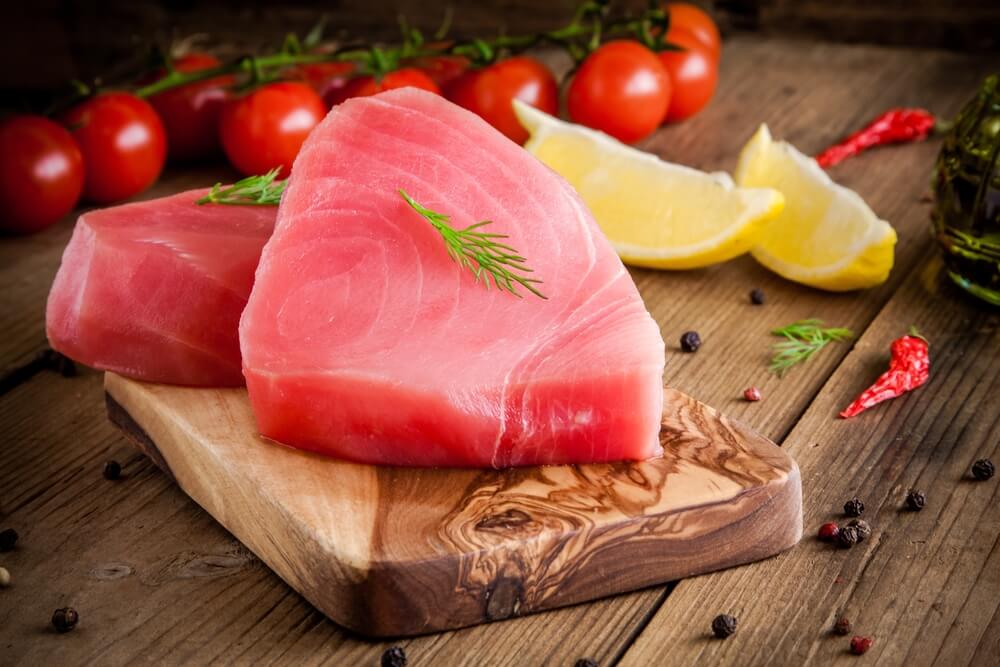Tuna is an excellent dietary choice if you’re trying to lose weight. It’s affordable, it’s tasty, and it’s packed full of protein and other nutrients your body needs.
The article explores the benefits of including tuna as part of your diet, how much you should eat, and what kinds of tuna are best for you.
Why Is Tuna Good For Weight Loss?
Tuna is a low-calorie food, so it can leave you feeling full without adding a lot of calories to your intake. Since one of the key components in dieting and weight loss is maintaining a calorie deficit, this is very helpful.
Tuna’s high protein content provides necessary components for building muscle. Protein also takes longer to digest than things like carbohydrates, which means you’ll feel hungry less often.
Tuna also contains high amounts of omega-3 fatty acids. Omega-3 fatty acids are important for healthy cell development within the body.
Aside from the nutritional benefits, tuna is good for your budget too. It’s cheaper than other high-protein foods like steak or special protein shakes, and it tastes great in a wide variety of dishes.
Salads, vegetable bowls, pasta dishes…almost any lunch or dinner can be supplemented with tuna to create a tasty meal. Or you can have it as a quick snack, all by itself.
Which Tuna Is Best For Weight Loss?
Experts generally recommend canned light tuna for weight loss. Most canned tuna is made with skipjack tuna, which is considered the healthiest option.
Dietary experts recommend choosing canned tuna that has been packed in water rather than oil. Oil-packed tuna tends to have more calories.
For those who prefer a fresher fish, small (3-4 ounce) tuna steaks are an excellent choice.
What Types Other than Skipjack Are Good for Weight Loss?
Yellowfin is a common choice. It can be found in cans, fillets, steaks, and sushi.
Albacore is another popular source of tuna. It has firmer meat and lighter flavor, and can be made found in canned tuna and tuna steaks.
In terms of calories, albacore has more calories than yellowfin and skipjack. However, the calorie count is still low enough for it to be a good choice for weight loss.
How Much Canned Tuna Is Safe to Eat Per Week?
Research by the FDA and EPA recommends eating no more than 2 to 3 servings of canned tuna per week. The average serving is around 4 ounces, so the recommended limit is 8-12 ounces.
The 2-3 serving recommendation primarily refers to skipjack tuna. For albacore or yellowfin, the recommended amount per week is a single serving.

Why Is There A Limit On How Much Tuna I Should Eat Per Week?
Tuna is often contaminated with mercury, which is toxic for humans. The recommended limits are in place to make sure you remain below the safety threshold for mercury consumption.
Skipjack has been found to have the lowest levels of mercury contamination. Albacore and yellowfin contain nearly 3 times the mercury contamination by comparison.
What if I Prefer Tuna Steaks?
Tuna steaks are usually made with albacore or yellowfin tuna. They usually have a slightly higher level of mercury contamination.
For this reason, experts recommend limiting your tuna steaks to 1 serving, or 3-4 ounces, per week.
What if I Prefer Tuna Sushi?
Tuna sushi is most often made with yellowfin tuna. EPA and FDA experts suggest limiting your sushi consumption to 1 roll.
What Brands Of Tuna Should I Look For?
When it comes to canned tuna, there are several choices. Most health and environmental studies recommend either Wild Planet or Safe Catch brands of tuna.
Another well-recommended brand is Oceans Naturals.
Is Starkist Tuna Recommended?
In terms of healthy choices, Starkist Tuna is often considered about the middle of the pack. It’s often packed with a little more salt than other brands.
On the positive side, their tuna pouches are a highly recommended snack for post-workouts.
Are There Any Brands I Should Avoid?
Sites like EatThis recommend against brands like Bumble Bee, due to its inclusion of soybean oil in some forms of packaging.
In general, it’s best to check the individual ingredients before making a choice. Look for options packed in water with low sodium and lower calorie counts to find your best choice
Are There Any Kinds of Tuna I Should Avoid for Weight Loss?
The FDA and EPA recommend avoiding bigeye tuna. Not only is it a fattier meat, but it also has higher levels of mercury contamination than many other kinds of tuna.


